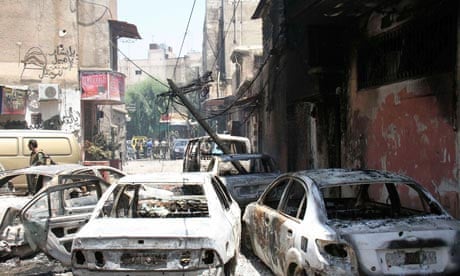President Bashar al-Assad's forces were fighting to regain control of key suburbs of Damascus after Syrian rebels seized border crossings and refugees streamed into neighbouring countries to escape the escalating crisis.
The UN security council agreed a 30-day extension to the UN's monitoring mission but fighting continued across the country. There were bodies on the streets of the capital amid signs the army had succeeded in subduing the central district of Midan – for now at least. Opposition sources described aircraft and helicopters attacking targets on the ground.
The Free Syrian Army confirmed it had withdrawn from the area under heavy bombardment. But rebel commanders said their forces remained active, with opposition fighters setting fire to a barracks used by the regime's Shabiha militia.
"Our heroic forces have completely cleansed the Midan area of the terrorist mercenaries," Syrian state TV announced.
With the situation changing by the hour, the government's control over large parts of the country continued to unravel. The FSA said it had captured two border crossings between Syria and Turkey as well as one in Iraq. The regime still holds key cities, at least during the day, but it appears increasingly vulnerable to guerilla raids.
Diplomats revealed that Assad had phoned the head of the UN monitoring mission, General Robert Mood, pledging to implement Kofi Annan's peace plan shortly after Wednesday's devastating bomb attack in Damascus, which killed four senior members of his military-security command. The UN says Assad and the rebels have failed to observe a ceasefire.
The foreign secretary, William Hague, warned the regime to end its "brutal assaults". But in the face of international divisions there is no obvious sanction if it does not. Damascus also flatly denied a suggestion from the Russian ambassador to France that the president was prepared to step down. It was "completely devoid of truth" said the information ministry.
Assad, said to be still in Damascus, did not attend the state funeral of three of Wednesday's victims including his brother-in-law Asef Shawkat. State TV announced that a fourth general had died of his injuries.
Reporters taken to Midan described massive destruction: shattered windows, dozens of damaged or charred cars, and the bodies of at least six young men lying in the street. One of them appeared to have been shot in the chest, the Associated Press reported. Others were bearded and dressed in black, with axes next to them. Activists said at least 300 people had been killed in the battle for Damascus.
The UN refugee agency said record numbers were now trying to escape the country with some 30,000 Syrians said to have fled into neighbouring Lebanon over the past 48 hours. Residents have reported that some banks were running out of cash, with queues for bread and other foodstuffs seen as Ramadan gets underway.
Yesterday rebels said they had recaptured the Bab al-Hawa border on the frontier with Turkey – which they seized on Thursday, only to surrender it again to government forces. They also said they held another border point at Jarablus.
In a further sign of regime erosion a Syrian general was reported to have fled to Turkey, bringing the number of fugitive generals there to 22. The rebels also now control a key Kamal/Qaim border crossing with Iraq, after slaughtering the 22 government soldiers tasked with guarding it. Iraqi troops have now sealed the crossing.
The capture of Syria's borders by the opposition was an important moment, analysts said, and showed Syria's 16-month conflict was now a fast-moving guerilla war. Fawwaz Traboulsi, a Beirut-based historian and columnist, said the tactics and strategy of the Free Syrian Army had improved, in contrast to the early days of the uprising.
"It's conducting a war that is very close to a guerrilla war. The FSA can move very easily. It can withdraw. It is taking whole regions and holding them," he said.
With Assad's options narrowing, and a diplomatic solution elusive, Traboulsi was sceptical that Assad would abandon Damascus and go abroad – even if he wished to.
He noted: "Bashar doesn't rule himself. He leads a family in power and a circle of army and security leaders. He can't simply whisk himself out of the country without their knowledge. If he flees the whole thing will collapse."
Others predicted the end was near. "The regime is going through its last days," Abdel Basset Sayda, the leader of the main Syrian opposition umbrella group, the Syrian National Council, said in Rome. Michael Young, a columnist with Beirut's Daily Star newspaper, agreed that the regime was disintegrating around the edges. "If you lose the borders you are allowing the creation of safe zones for weapons to come through. The Syrian regime holds the cities. But it doesn't control rural areas. And at night its control over the cities is very iffy. This is a new phenomenon," he observed.
Young added that it was still unclear who was behind Wednesday's bombing. He said there was no evidence for the widespread "conspiracy theory" that the blast may have been an "inside job", adding: "I would say all the versions are in some way decisively wrong."
Majid Arar, who lives closer to the scene of the attack, told the Guardian. "After hearing the news of the generals being killed there was some excitement and some joy, because people are furious [with the regime]. But when the government started bombarding people started to feel very scared. It's joy and at the same time fear for the future. People are now more open to talk about what's going on in the city, even on the telephone. People usually fear that the government is listening but are now more open to talking. Some barriers have been broken."
